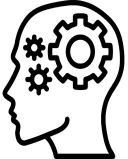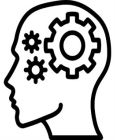Nootropics
5 Science-Backed Nootropics for Cognitive Processing
Based on 527 placebo-controlled studies, 5 supplements may improve cognition.
Posted September 24, 2020 Reviewed by Kaja Perina

A nootropic is a substance that, if used properly, safely enhances the cognitive functions of the user.
As public interest in cognitive enhancers escalates, the demand for high-quality evidence on the safety and efficacy of nootropics seems to outgrow the supply of that information. Although new placebo-controlled studies are published frequently, they can be hard to read and misrepresentative of the entire body of knowledge the scientific community has provided on the effects of nootropics. These are some of the reasons why we systematically went through 527 placebo-controlled studies [1] on the effects of 127 nootropics and put together a list with the 5 most science-backed ones for improving cognitive processing. If a nootropic was not included in this list, it doesn’t necessarily mean it’s ineffective for increasing cognitive processing. It likely means there is less research on the effects of that compound in healthy humans than there’s for each nootropic that made it on to the list.
Out of the 527 studies, 65 included measures of cognitive processing. A total of 5,630 participants had their cognitive processing tested, and 19 nootropics were assessed for safety and efficacy for improving cognitive processing. Based on this body of evidence, these are the 5 most science-backed nootropics for increasing cognitive processing in healthy humans.
Bacopa Monnieri
In the 11 studies we reviewed which examined the effects of Bacopa Monnieri on measures of cognitive processing, 500 participants were included. [2-12]
Overall, these studies found a small positive effect on cognitive processing from use of Bacopa Monnieri.
The evidence we reviewed also suggests that Bacopa Monnieri can improve:
- Mood (small effect)
- Nervousness (small effect)
- Memory (small effect)
- Focus (small effect)
- Energy (minute effect)
- Learning (small effect)
- Mindfulness (large effect)
Risks
Side effects
Less than 50% experience:
- Increased stool frequency (pooping more than usual)
Less than 30% experience:
- Gastrointestinal cramps
- Nausea
Less than 10% experience:
Less than 1% experience:
- Drowsiness
- Cold/flu symptoms
- Allergies
- Skin rash
- Skin itching
- Headache
- Tinnitus
- Vertigo
- Strange taste in mouth
- Dry mouth
- Palpitations
- Abdominal pain
- Appetite increase
- Excessive thirst
- Nausea
- Indigestion
- Constipation
- Increased regularity of bowel movements
- Increased frequency of urine
- Muscular fatigue
- Muscular pain
- Cramps
- Increase in felt stress
- Worsened mood
Legality
Bacopa Monnieri is legal to buy, possess, and use in United States, United Kingdom, Sweden, Canada and Australia. [13-19][20-31]
Conclusion
A relatively large amount of evidence suggests Bacopa Monnieri has a small positive impact on cognitive processing. Moreover, Bacopa Monnieri is generally safe and legal.
How to Use
It is probably safer and more effective to use nootropics as they have been used in studies on humans. In the studies we’ve reviewed, Bacopa Monnieri was used in the following ways:
- 450 mg dosages daily for 12 weeks [2]
- 320 mg doses for acute effects [3]
- 640 mg doses for acute effects [3]
- 640 mg doses for acute effects [4]
- 320 mg doses for acute effects [4]
- 300 mg doses for acute effects [5]
- 300 mg dosages daily for 12 weeks [6]
- 600 mg doses for acute effects [7]
- 300 mg doses for acute effects [7]
- 300 mg dosages daily for 12 weeks [8]
- 300 mg dosages daily for 6 weeks [9]
- 300 mg doses for acute effects [10]
- 250 mg dosages daily for 16 weeks [11]
- 300 mg dosages daily for 12 weeks [12]
Sage
In the 4 studies we reviewed which examined the effects of Sage on measures of cognitive processing, 110 participants were included. [32-35]
Overall, these studies found a minute positive effect on cognitive processing from use of Sage.
The evidence we reviewed also suggests that Sage can improve:
- Mood (minute effect)
- Nervousness (small effect)
- Memory (minute effect)
- Focus (minute effect)
- Energy (minute effect)
- Sociality (small effect)
- Stress (minute effect)
- Learning (small effect)
- Mindfulness (minute effect)
Risks
Side effects
No negative side effects were seen in any of the studies we reviewed.
Legality
Sage is legal to buy, possess, and use in the United States and Canada. [14-16][23-26][36][37]
Conclusion
A relatively large amount of evidence suggests Sage has a minute positive impact on cognitive processing. Moreover, Sage is generally safe and legal.
How to Use
It is probably safer and more effective to use nootropics as they have been used in studies on humans. In the studies we’ve reviewed, Sage was used in the following ways:
- 300 mg extract doses for acute effects [32]
- 600 mg extract doses for acute effects [32]
- 50 µl essential oil doses for acute effects [33]
- 100 µl essential oil doses for acute effects [33]
- 150 µl essential oil doses for acute effects [33]
- 25 µl essential oil doses for acute effects [33]
- 50 µl essential oil doses for acute effects [33]
- 50 mg extract doses for acute effects [34]
- 167 mg extract doses for acute effects [35]
- 333 mg extract doses for acute effects [35]
- 666 mg extract doses for acute effects [35]
- 1332 mg extract doses for acute effects [35]
Panax Ginseng
In the 5 studies we reviewed which examined the effects of Panax Ginseng on measures of cognitive processing, 140 participants were included. [38-41][43]
Overall, these studies found a minute positive effect on cognitive processing from use of Panax Ginseng.
The evidence we reviewed also suggests that Panax Ginseng can improve:
- Mood (small effect)
- Nervousness (small effect)
- Focus (minute effect)
- Energy (minute effect)
- Sociality (small effect)
- Stress (small effect)
- Mindfulness (small effect)
Risks
Side effects
No negative side effects were seen in any of the studies we reviewed.
Legality
Panax Ginseng is legal to buy, possess, and use in the United States and Canada. [14-16][23-26][44][45]
Conclusion
A relatively large amount of evidence suggests Panax Ginseng has a minute positive impact on cognitive processing. Moreover, Panax Ginseng is generally safe and legal.
How to Use
It is probably safer and more effective to use nootropics as they have been used in studies on humans. In the studies we’ve reviewed, Panax Ginseng was used in the following ways:
- 4500 mg non-extract powder dosages daily for 2 weeks [38]
- 200 mg extract doses for acute effects [39]
- 200 mg extract doses for acute effects [40]
- 200 mg extract doses for acute effects [41]
- 400 mg extract doses for acute effects [41]
- 200 mg extract dosages daily for 1 week [42]
- 400 mg extract dosages daily for 1 week [42]
- 400 mg extract doses for acute effects [43]
Rhodiola
In the 2 studies we reviewed which examined the effects of Rhodiola on measures of cognitive processing, 154 participants were included. [46][47]
Overall, these studies found a large positive effect on cognitive processing from use of Rhodiola.
The evidence we reviewed also suggests that Rhodiola can improve:
- Memory (large effect)
- Focus (large effect)
- Energy (large effect)
Risks
Side effects
Less than 20% experience:
- Headache
Less than 10% experience:
- Diarrhea
- Dark stool
- Nausea
- Blurred vision
Legality
Rhodiola is legal to buy, possess, and use in United States, United Kingdom, Sweden, Canada and Australia. [14-21][23][24][25][26][29][50–55]
Conclusion
Preliminary evidence suggests Rhodiola has a large positive impact on cognitive processing. Moreover, Rhodiola is generally safe and legal.
How to Use
It is probably safer and more effective to use nootropics as they have been used in studies on humans. In the studies we’ve reviewed, Rhodiola was used in the following ways:
- 600 mg dosages daily for 4 weeks [46]
- 555 mg doses for acute effects [47]
- 370 mg doses for acute effects [47]
- 364 mg dosages daily for 6 weeks [48]
- 170 mg dosages daily for 2 weeks [49]
Guarana
In the 1 study we reviewed which examined the effects of Gurana on measures of cognitive processing, 28 participants were included. [40]
This study found a minute positive effect on cognitive processing from use of Guarana.
The evidence we reviewed also suggests that Guarana can improve:
- Memory (minute effect)
- Focus (minute effect)
- Energy (minute effect)
- Learning (minute effect)
Risks
Side effects
No negative side effects were seen in any of the studies we reviewed.
Legality
Guarana is legal to buy, possess, and use in United States, United Kingdom, Sweden, Canada and Australia. [14-21][23-26][28][29][31][57][58][59][60]
Conclusion
A large amount of evidence suggests Guarana has a minute positive impact on cognitive processing. Moreover, Guarana is generally safe and legal.
How to Use
It is probably safer and more effective to use nootropics as they have been used in studies on humans. In the studies we’ve reviewed, Guarana was used in the following ways:
- 1,080 mg doses for acute effects [56]
- 75 mg doses for acute effects [40]
If you have the right mindset to nootropic use (awareness of risks and how to avoid them), you’re in a great position to benefit from cognitive enhancers.
There’s a need for more research on each of the nootropics in this list. Specifically, there’s a great degree of individual variance in how people respond to nootropics. This means that if you use a nootropic that there was a small effect from in a study with dozens of participants, you may get no effect or a large effect. Currently, while we wait for science to elucidate who is likely to respond to which nootropics, patient self-experimentation is the best method for nootropic use success.
This blog post is not a substitute for professional medical advice, diagnosis, or treatment.
References
[1] https://nootralize.com/how-nootralize-researches-nootropics/
[2] https://www.gwern.net/docs/nootropics/2013-sathyanarayanan.pdf
[3] https://pubmed.ncbi.nlm.nih.gov/23788517/
[4] https://pubmed.ncbi.nlm.nih.gov/23281132/
[5] https://pubmed.ncbi.nlm.nih.gov/12404571/
[6] https://pdfs.semanticscholar.org/ac3e/6ae7e127641fbabe125008adf4ae78a98…
[7] https://www.ncbi.nlm.nih.gov/pmc/articles/PMC3537209/
[8] https://www.ncbi.nlm.nih.gov/pmc/articles/PMC3153866/
[9] https://www.ncbi.nlm.nih.gov/pmc/articles/PMC5075615/
[10] https://www.wsj.com/public/resources/documents/study%202.pdf?mod=articl…
[11] https://www.ncbi.nlm.nih.gov/pmc/articles/PMC2915594/
[12] https://link.springer.com/article/10.1007/s002130100815
[13] https://dsld.nlm.nih.gov/dsld/prdLabel.jsp?id=63707
[14] https://www.tsa.gov/travel/security-screening/whatcanibring/items/suppl…
[15] https://www.faa.gov/hazmat/packsafe/
[16] https://www.fda.gov/industry/import-basics/personal-importation
[17] https://www.gov.uk/government/publications/list-of-banned-or-restricted…
[18] https://www.gov.uk/hand-luggage-restrictions/essential-medicines-and-me…
[19] https://assets.publishing.service.gov.uk/government/uploads/system/uplo…
[20] https://www.transportstyrelsen.se/sv/luftfart/Flygresenar/Bagage/Vad-fa…
[21] https://www.tullverket.se/sv/privat/handlapanatet/kosttillskottpanatet…
[22] http://webprod.hc-sc.gc.ca/nhpid-bdipsn/ingredReq.do?id=5924&lang=eng
[23] https://www.catsa-acsta.gc.ca/en/medication-and-medical-items
[24] https://www.canada.ca/en/health-canada/services/drugs-health-products/n…
[25] https://www.canada.ca/en/health-canada/services/drugs-health-products/n…
[26] https://www.canada.ca/en/health-canada/services/drugs-health-products/c…
[27] https://www.odc.gov.au/ws-lps-index?search_api_views_fulltext=bacopa-mo…
[28] https://www.abf.gov.au/entering-and-leaving-australia/can-you-bring-it-…
[29] https://www.abf.gov.au/entering-and-leaving-australia/can-you-bring-it-…
[30] https://www.ebs.tga.gov.au/ebs/PublicHTML/pdfstore.nsf/TemplateEngineIn…
[31] https://www.tga.gov.au/personal-importation-scheme
[32] https://www.nature.com/articles/1300907
[33] http://citeseerx.ist.psu.edu/viewdoc/download?doi=10.1.1.921.6614&rep=r…
[34] https://pubmed.ncbi.nlm.nih.gov/20937617/
[35] https://www.researchgate.net/publication/5502737_An_extract_of_Salvia_s…
[36] https://dsld.nlm.nih.gov/dsld/prdLabel.jsp?id=79901
[37] http://webprod.hc-sc.gc.ca/nhpid-bdipsn/ingredReq.do?id=14125&lang=eng
[38] https://www.ncbi.nlm.nih.gov/pmc/articles/PMC3659585/
[39] https://pubmed.ncbi.nlm.nih.gov/16401645/
[40] https://www.essentialnutrition.com.br/media/artigos/quantum/22.%20Impro…
[41] https://pubmed.ncbi.nlm.nih.gov/15982990/
[42] https://pubmed.ncbi.nlm.nih.gov/20737519/
[43] https://www.academia.edu/924620/Modulation_of_cognition_and_mood_follow…
[44] https://dsld.nlm.nih.gov/dsld/prdLabel.jsp?id=42816
[45] http://webprod.hc-sc.gc.ca/nhpid-bdipsn/ingredReq.do?id=6326&lang=eng
[46] https://www.ncbi.nlm.nih.gov/pmc/articles/PMC6230218/
[47] https://pubmed.ncbi.nlm.nih.gov/12725561/
[48] https://journals.plos.org/plosone/article?id=10.1371/journal.pone.01084…
[49] https://www.ncbi.nlm.nih.gov/pubmed/11081987
[50] https://dsld.nlm.nih.gov/dsld/prdLabel.jsp?id=45184
[51] https://www.lakemedelsverket.se/sv/sok-lakemedelsfakta?prodClass=3&acti…
[52] http://webprod.hc-sc.gc.ca/nhpid-bdipsn/ingredReq.do?id=6416&lang=eng
[53] https://www.odc.gov.au/ws-lps-index?search_api_views_fulltext=rhodiola-…
[54] https://www.legislation.gov.au/Details/F2020C00148/Html/Text#_Toc318059…
[55] https://www.ebs.tga.gov.au/
[56] https://www.ncbi.nlm.nih.gov/pmc/articles/PMC3664636/
[57] https://dsld.nlm.nih.gov/dsld/prdLabel.jsp?id=83081
[58] http://webprod.hc-sc.gc.ca/nhpid-bdipsn/ingredReq.do?id=6333&lang=eng
[59] https://www.odc.gov.au/ws-lps-index?search_api_views_fulltext=guarana&i…
[60] https://www.ebs.tga.gov.au/ebs/PublicHTML/pdfstore.nsf/TemplateEngineIn…




